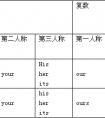根据句子意思,用括号中所给单词的适当形式填空。1. Come and warm _____ (you) by the fire ,Millie and Jane .2. —How beautiful the dress looks.—It must be one of-九年级英语
I have seen this film twice with my friends. 这部电影我和朋友看过两次。
2、副词修饰形容词,副词时,副词在前面,而被修饰的词在后面。
It's rather easy, I can do it. 这很容易,我能做到。
He did it quite well. 他做得相当好。
It's rather difficult to tell who is right.很难说谁是对的。
It's so important that I must tell my friends. 这件事太重要了,我得告诉我的朋友。
It's much better. 好多了。
3、频度副词可放在实义动词的前面,情态动词和助动词的后面。
I often help him these days. 这些日子我经常帮助他。
I always remember the day when I first came to this school.
我常常记得我第一次来学校的那一天。
You mustn't always help me. 你不能老是帮助我。
He seldom comes to see us. 他很少来看我们。
We usually go shopping once a week. 我们通常一周买一次东西。
The new students don't always go to dance. 新学生并不时常去跳舞。
4、疑问副词,连接副词,关系副词以及修饰整个句子的副词,通常放在句子或从句的前面。
When do you study everyday? 你每天什么时间学习?
Can you tell me how you did it? 你能告诉我你如何做的吗?
First, let me ask you some questions. 先让我来问几个问题。
How much does this bike cost? 这辆车子多少钱?
Either you go or he comes. 不是你去就是他来。
The students were reading when the teacher came into the classroom. 当老师进教室时,学生们正在读书。
5、时间副词和地点副词在一个句中, 地点副词在前面时间副词在后面。
We went shopping in the supermarket at 9 o'clock yesterday.
昨天九点钟我们到超市买东西了.
What were you doing in the classroom yesterday afternoon?
昨天下午你在教室里干什么?
The accident took place in the Eleven Avenue one hour ago.
一小时前十一号大街发生了一场事故。
6、否定副词在句首,句子要倒装,如:
Never have I felt so excited!
1) close与closely
close意思是"近"; closely 意思是"仔细地"
He is sitting close to me.
Watch him closely.
2) late 与lately
late意思是"晚"; lately 意思是"最近"
You have come too late.
What have you been doing lately?
3) deep与deeply
deep意思是"深",表示空间深度;deeply时常表示感情上的深度,"深深地"
He pushed the stick deep into the mud.
Even father was deeply moved by the film.
4) high与highly
high表示空间高度;highly表示程度,相当于much
The plane was flying high.
I think highly of your opinion.
5) wide与widely
wide表示空间宽度;widely意思是"广泛地","在许多地方"
He opened the door wide.
English is widely used in the world.
6) free与freely
free的意思是"免费";freely 的意思是"无限制地"
You can eat free in my restaurant whenever you like.
You may speak freely; say what you like.
副词有加a或ly的 区别在于通常加a 的副词描述一种状态,而加ly 的副词则倾向于感觉。
考点名称:实义动词的过去式
- 表示一般过去式的动词通常用动词的过去式形式来表示,而动词的过去式是在动词原形的基础上变化的。
动词的过去式可分为规则动词和不规则动词。 实意动词过去式变化规则:
注:以l结尾的动词,尾音节重读时,双写l,如control—controlled;分类 构成 例句 一般情况下 在词尾直接加ed ask—asked
work—worked以不发音的e结尾 只加d love—loved
dance—danced
以辅音字母加y结尾 变y为i,再加-ed try—tried
study—studied以一个元音字母和一个辅音结尾的
重读音节结尾的动词先双写末尾一个字母,再加ed stop—stopped
permit—permitted“-ed”的读音规则 1.在清辅音后面读[t],如:help—helped[helpt]
2.在浊辅音或元音后读[d],如:learn—learned
3.在[t]和[d]后读[id],如:want—wantedneed—needed
尾音节不重读时,双不双写都可以,如travel—traveled/traveled。
特例:picnic—picnicked,另外还有很多动词的过去式是不合乎上述规则的,常见的有:
常用的有:
begin—began, bring—brought, come—came, draw—drew,
drink—drank, drive—drove, eat—ate, feel—felt,
get—got, give—gave, go—went, grow—grew,
have (has)—had, keep—kept, know—knew, leave—left,
make—made, read—read, run—ran, say—said,
see—saw, sit—sat几个特殊实意动词过去式用法:
a.beat的过去式与原形同形:
beat(打击)
beat(过去式)
beaten(过去分词)
b.lie有规则变化和不规则变化两种,含义不同
lie,lied, lied(说谎)
lay, lain(躺,位于)c.hang有规则变化和不规则变化两种,含义不同
hang,hanged, hanged(处绞刑)
hung, hung(挂,吊)d. welcome(欢迎)一词是规则动词,不可误用为不规则动词
welcome welcomed, welcomed(正)
welcome, welcome(误)e.不要将不规则动词误用为规则动词
hit(打)
hit, hit(正)
hitted, hitted(误)- 实意动词过去式用法基本句式:
1.主+V-ed+宾+其它。。。(肯定句)
2.主+didn't+V原+宾+其它。。。
3.Did+主+V原+宾+其它。。。+?
4.回答:Yes,主语代词+did\No,主语代词+didin't.
5.特殊疑问句:特殊疑问词+一般疑问句。 - 实义动词的一般过去时态:
肯定句要使用动词的过去式,否定句和疑问句要使用助动词do和 does 的过去式 did.
肯定句为:
主语+动词过去式+宾语 如:
I went home at nine o'clock yesterday.
否定句:
主语+didn't +动词原形+宾语 如:
I didn't go home yesterday. He didn't tell me about you.
疑问句:
一般疑问句:
Did +主语+动词原形+宾语
如:Did you go home yesterday?
Did you study in the school?
肯定回答: Yes, I did.
否定回答:No, I didn't.
特殊疑问句:特殊疑问词+did +主语+动词原型+宾语
When did you finish your homework last night?
What did you do the day before yesterday?
- 最新内容
- 相关内容
- 网友推荐
- 图文推荐
| [家长教育] 孩子为什么会和父母感情疏离? (2019-07-14) |
| [教师分享] 给远方姐姐的一封信 (2018-11-07) |
| [教师分享] 伸缩门 (2018-11-07) |
| [教师分享] 回家乡 (2018-11-07) |
| [教师分享] 是风味也是人间 (2018-11-07) |
| [教师分享] 一句格言的启示 (2018-11-07) |
| [教师分享] 无规矩不成方圆 (2018-11-07) |
| [教师分享] 第十届全国教育名家论坛有感(二) (2018-11-07) |
| [教师分享] 贪玩的小狗 (2018-11-07) |
| [教师分享] 未命名文章 (2018-11-07) |

![One of the climbers tried to pull ______up the rocks. Finally, he was lucky to get to the top. [ ]A. themselves B. himselfC. herself D. itself-八年级英语](http://www.00-edu.com/d/file/ks/4/2/fanshendaici/2019-12-01/small41ed7588e270175b6fd8ba260e900d321575203896.png)
![Sally buys a watch for father andasweater for_______.[ ]A. she; herselfB. her; herselfC. herself; herD. her; her-七年级英语](http://www.00-edu.com/d/file/ks/4/2/fanshendaici/2019-12-01/small3f1788cd5867bf4768797f36ec9e81961575203859.jpg)


![Don't lose ________ computer games, little boys! [ ]A. yourself toB. yourself in C. yourselves to D. yourselves in-八年级英语](http://www.00-edu.com/d/file/ks/4/2/fanshendaici/2019-12-01/smallce83f3a5e50b48d2e8ee989a20c11b101575203887.png)
